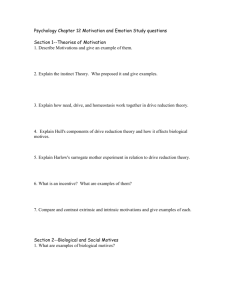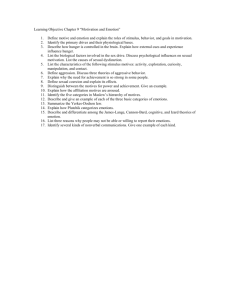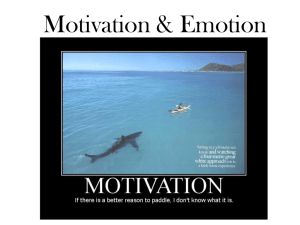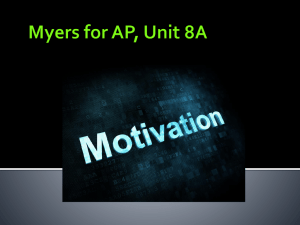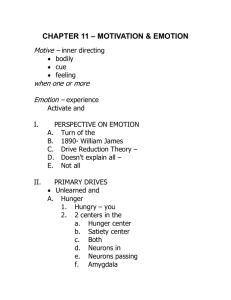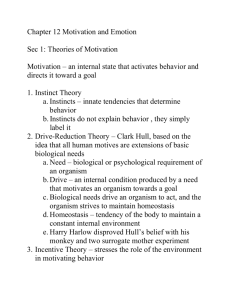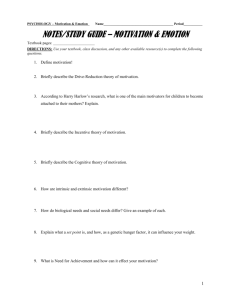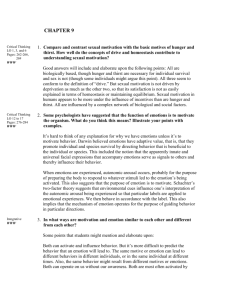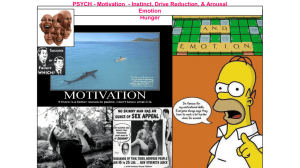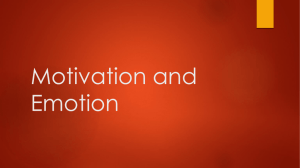Motivation and Emotion 4 print
advertisement
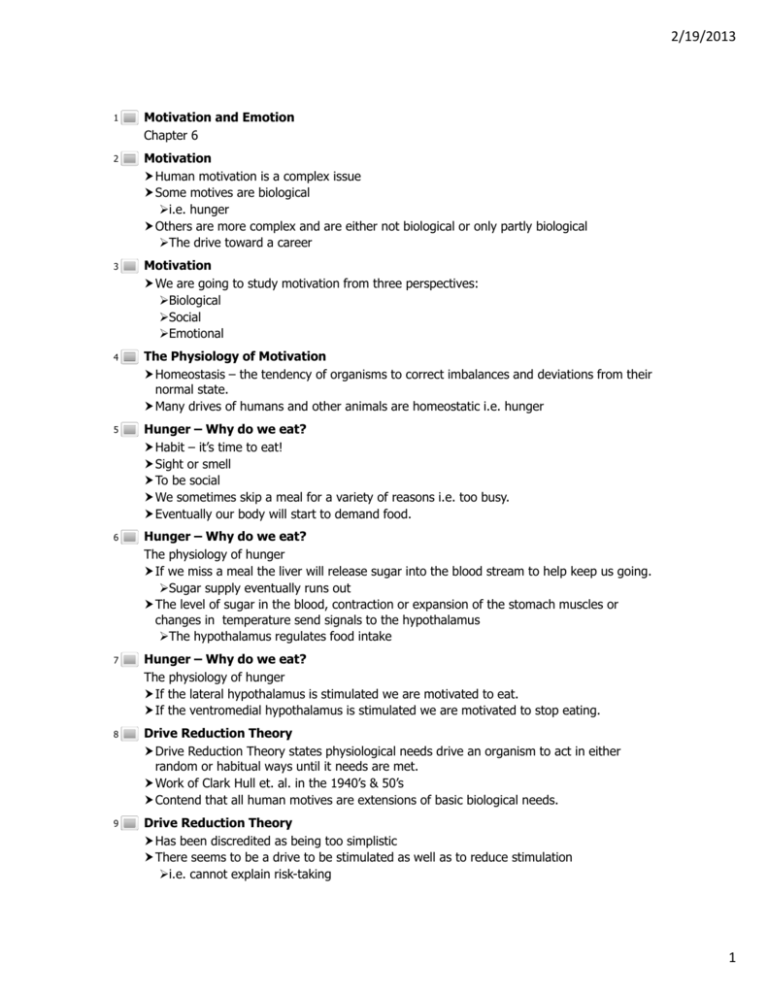
2/19/2013 1 Motivation and Emotion Chapter 6 2 Motivation Human motivation is a complex issue Some motives are biological i.e. hunger Others are more complex and are either not biological or only partly biological The drive toward a career 3 Motivation We are going to study motivation from three perspectives: Biological Social Emotional 4 The Physiology of Motivation Homeostasis – the tendency of organisms to correct imbalances and deviations from their normal state. Many drives of humans and other animals are homeostatic i.e. hunger 5 Hunger – Why do we eat? Habit – it’s time to eat! Sight or smell To be social We sometimes skip a meal for a variety of reasons i.e. too busy. Eventually our body will start to demand food. 6 Hunger – Why do we eat? The physiology of hunger If we miss a meal the liver will release sugar into the blood stream to help keep us going. Sugar supply eventually runs out The level of sugar in the blood, contraction or expansion of the stomach muscles or changes in temperature send signals to the hypothalamus The hypothalamus regulates food intake 7 Hunger – Why do we eat? The physiology of hunger If the lateral hypothalamus is stimulated we are motivated to eat. If the ventromedial hypothalamus is stimulated we are motivated to stop eating. 8 Drive Reduction Theory Drive Reduction Theory states physiological needs drive an organism to act in either random or habitual ways until it needs are met. Work of Clark Hull et. al. in the 1940’s & 50’s Contend that all human motives are extensions of basic biological needs. 9 Drive Reduction Theory Has been discredited as being too simplistic There seems to be a drive to be stimulated as well as to reduce stimulation i.e. cannot explain risk-taking 1 2/19/2013 Many drives such as hunger, thirst, and curiosity seem to be unlearned/innate. 10 Social Motives Social motives differ from biological motives because they are learned from our interactions with other people. Henry Murray identified 16 basic needs. See list on page 139. Of the needs he listed the need for achievement has been well researched. 11 The Need for Achievement Based on work by David McClelland and others in the 1950’s Showed subjects a series of pictures and asked them to make up a story about the picture. Stories reveal unconscious desires. Tester looks for themes to determine psychological needs such as achievement 12 The Need for Achievement McClelland found high correlation between high achievers and occupations Developed a program to train people to be high achievers. Virtually all of his subjects were males. 13 Fear of Success Women (at least in the 1970’s) seemed to have a motive to avoid success. Women fear social isolation if compete with men. Harder to define success for women. Some researchers show a bias against the stay-at-home moms. Defining success for anyone can be a problem. 14 Maslow’s Hierarchy of Needs Abraham Maslow was a pioneer in humanistic psychology Saw the need for achievement in the context of a hierarchy of needs all people share He believed that people have to satisfy fundamental needs before they are able to function at higher levels 15 Maslow’s Hierarchy of Needs Fundamental Needs Physiological needs: hunger, thirst, sex drives. Safety needs: security, safety, out of danger. Psychological Needs Belongingness & love: affiliation with other, acceptance, belonging. Esteem Needs: achievement, competency, gaining approval, recognition Self-Actualization Needs – the need to fulfill one’s unique potential 16 Maslow’s Hierarchy of Needs 17 Maslow’s Hierarchy of Needs Maslow believed that needs at a lower level must be met before needs at a higher level can be addressed Believed that everyone has self-actualization needs but that very few people achieve that level 18 Emotion Hard to distinguish between emotion and motive. 2 2/19/2013 Motivation describes the source of our behavior Emotion describes the feeling associated with our behavior Emotion and motivation are intertwined and often hard to distinguish Emotion Emotions can function like biological drives May energize us to pursue a goal Anticipation of an emotion may be an incentive for our actions The consequences of striving for a goal may evoke emotions 19 20 1 2 Emotion Anger Contempt Disgust Fear Happiness Sadness Surprise 21 Physiological Theories The Cannon-Bard Theory Believed that emotion was a result of the thalamus being activated in response to certain experiences. Cannon was the first to describe the “fight or flight” reaction Later research found the seat of emotion to be the hypothalamus and not the thalamus 22 Cognitive Theories Believe that bodily changes and thinking work together to produce emotions. What we feel does not only depend on physiological arousal but on how we interpret our symptoms. Affected by what is going on in our mind and in our environment 23 Cognitive Theories Schachter-Singer Experiment (see pp. 151-152 of text) Concluded that perception and arousal interact to create emotions. 24 Cognitive Theories Arnold’s Theory Everyday emotions can be analyzed into a series of stages Perception Appraisal Bodily change Emotion Action 25 Conclusion Emotions and physical changes are intertwined. 3
